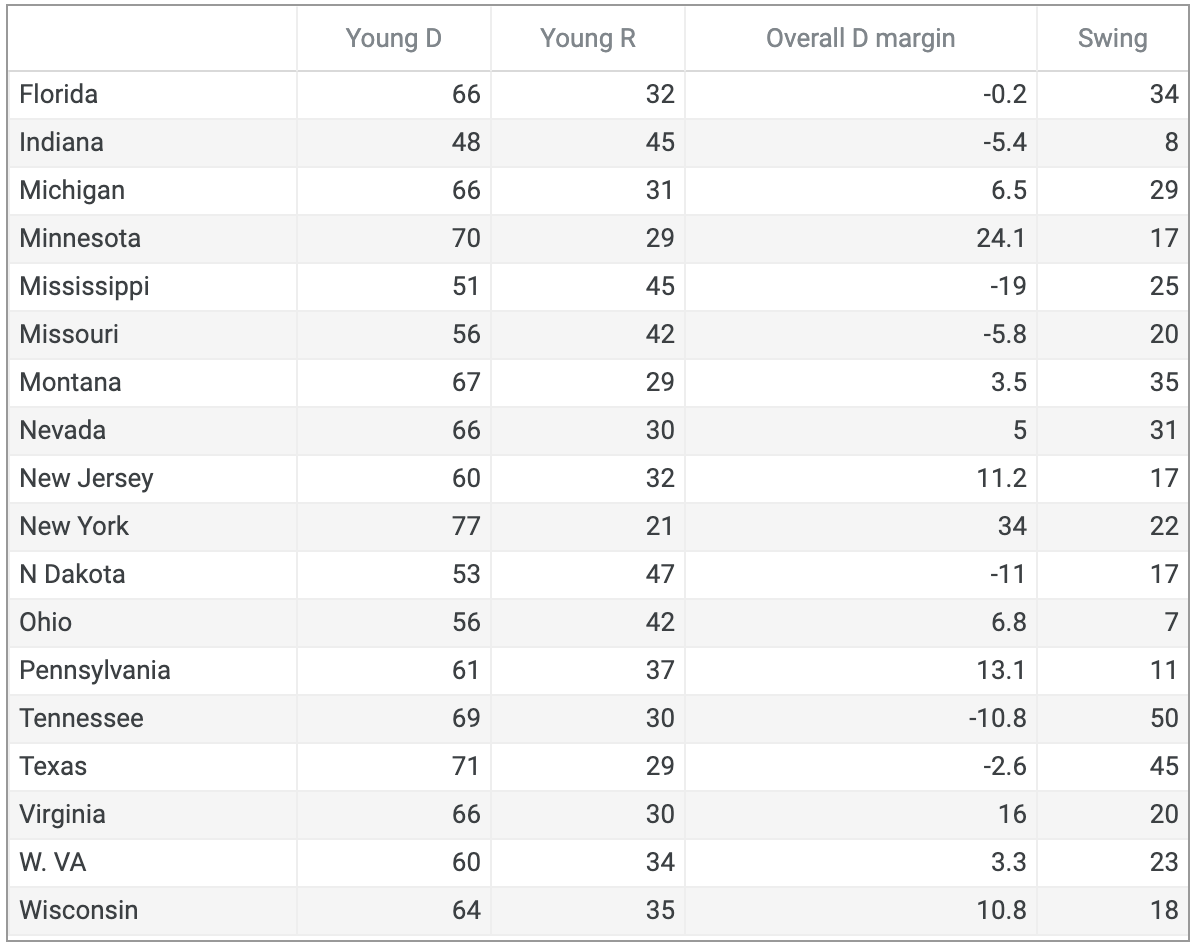The clock is ticking on Republicans' Senate advantage
Even without major reforms, they're facing a demographic tsunami


A free daily email with the biggest news stories of the day – and the best features from TheWeek.com
You are now subscribed
Your newsletter sign-up was successful
For years the conventional wisdom has been that Republicans enjoy a healthy structural advantage in the race for the U.S. Senate. It's how Republicans were able to expand their majority in that chamber despite a brutal national environment in 2018, and it's how senators representing a minority of the U.S. population will be able to plow forward with Amy Coney Barrett's Supreme Court nomination before the election, confident that even if they kick away the Senate this year, it won't be long before they are back in power. That edge is one of the many reasons I've long advocated for making Washington, D.C. and Puerto Rico the 51st and 52nd states as the first order of business should Democrats ever recapture the House, Senate, and presidency at the same time.
The conventional wisdom is due for a revision either way. Unfortunately for Mitch McConnell and his allies, the same demographic trends that threaten to relegate the national Republican Party to long-term minority status are coming for the GOP's Senate power too. All over the country, young people are in open revolt against the GOP. Tired of the racist culture wars, furious with an economic system that has failed to deliver prosperity to the millennial and 'Zoomer' generations, and disgusted by the GOP's climate denialism, the youngest voters have broken for Democrats by double digits more than the electorate as a whole since 2004. The trend long predates the rise of the odious Donald Trump, but it has certainly been exacerbated by his ugly antics.
Republicans have now spent a decade governing and campaigning as if they don't have any interest in winning a national majority and clearly believe that the long-run redoubts of their power are in the U.S. Senate and the federal court appointments it controls. They may receive a wake-up call in two weeks, but even if they don't, their long-term outlook is grimmer than is commonly understood. Judging by the 2018 exit polls and the numbers we see so far this year, some of the states they take for granted as part of their minoritarian hold on the Senate are slipping away.
The Week
Escape your echo chamber. Get the facts behind the news, plus analysis from multiple perspectives.

Sign up for The Week's Free Newsletters
From our morning news briefing to a weekly Good News Newsletter, get the best of The Week delivered directly to your inbox.
From our morning news briefing to a weekly Good News Newsletter, get the best of The Week delivered directly to your inbox.
Take Montana. In a state that Donald Trump carried by more than 20 percent, 18-29 year-olds saved the seat of incumbent Democratic Sen. Jon Tester in 2018 by giving him a 38-point margin in a race he won by fewer than four. In Texas, Democrat Beto O'Rourke did 45 points better with the youngest cohort than the 2018 electorate as a whole, which narrowly voted for Republican Ted Cruz. In Missouri, Claire McCaskill did 20 points better with this group. In Mississippi, a low-profile Democratic Senate candidate named David Baria outperformed his statewide margin with these voters by 25. These are all states that are currently out of reach for Democrats but form a critical part of the GOP's Senate majority.
The first two columns in the chart below show the 18-29 split for the 2018 Democratic and Republican Senate candidate. The third shows the overall Democratic margin in the race, and the fourth calculates the 'swing' away from the results and toward Democrats for the youngest voters. As you can see, Democrats did better with 18-29 year-olds than the electorate as a whole in every 2018 Senate race for which there is exit polling, ranging from 7 points in Ohio to nearly 50 points in Tennessee.

If it was just one age bloc of voters tilting Democratic, Republicans might be tempted to dismiss it as the product of President Trump's unique repulsiveness. But in most of these states, Republican candidates lost the 30-44 cohort as well, comprised of millennials and younger Gen Xers. In Tennessee, Democrat Phil Bredesen won them by 15; in Texas it was Beto O'Rourke by 4, and in Missouri, it was Claire McCaskill by 7. The Arizona data is not broken down by cohort, but Democrat Kyrsten Sinema beat Republican Martha McSally by 21 points overall among voters under 45. In fact, the only race where the GOP won 30-44 year-olds was in North Dakota. Not to belabor the obvious here, but the Republican Party cannot survive as any kind of national force if its candidates continue to decisively lose two generations of voters with no sign that they are making inroads with rising 18-year-olds.
The trends of 2018 look like they will repeat themselves in a similar national environment this year. A recent New York Times/Siena poll of the South Carolina Senate race has Democrat Jamie Harrison leading Republican Sen. Lindsey Graham by 27 points with 18-29s. A Quinnipiac poll of Iowa had Democrat Theresa Greenfield leading Republican incumbent Joni Ernst by 19 points with 18-34 year-olds. A Civiqs poll of North Carolina had Democrat Cal Cunningham leading Republican Sen. Thom Tillis by 19 points with voters under 35. I'm not intentionally cherry-picking — it's just that there's no good news for Republicans with this age group. Not in the Sun Belt. Not in Alaska. Not in the Midwest. Not anywhere. It really raises the question of whether any states at all are trending red.
A free daily email with the biggest news stories of the day – and the best features from TheWeek.com
Republicans might be tempted to laugh their struggles off with some recitation of the old nostrum that "if you're not a liberal at 25 you have no heart and if you're not a conservative at 50 you have no brain." There is a widespread and mistaken assumption that young voters have always been more liberal than the rest of the electorate only to shift right when they have families, acquire property, and start resenting their tax rates. But there is almost no data to back this presumption up — just a handful of high-profile left-to-right party switchers that happened to include the most renowned Republican president of the 20th century, Ronald Reagan.
In fact, Reagan won the youngest voters in 1984 by a much larger margin than he tallied overall against Walter Mondale. Republicans were competitive with young voters throughout the second half of the 20th century, and as recently as 2000, there was no meaningful difference between age cohorts for Al Gore and George W. Bush. It was the twin policy disasters of the Bush years — the Iraq War and the financial crisis — that turned millennials into a solidly Democratic cohort. And President Trump was repulsing 18-year-old voters even before the COVID-19 nightmare, suggesting that the GOP's inability to appeal to young people on a variety of policy issues was more important to them than the relatively strong pre-virus economy.
There's no sugarcoating how terrible this is for Republicans. The balance of the scholarship on this questions suggests that partisanship tends to harden with age, and that only major life disruptions like a divorce or a move to an area with dramatically different partisanship can shake adults out of their party preferences. As Pew puts it, "generations carry with them the imprint of early political experiences." How do you think today's high schoolers and young adults are going to feel about the Trump era?
Of course, millions of people will still change their ideas and ultimately their party preferences, but that movement happens in both directions. The best data you can find for the GOP is that perhaps a slightly larger number of people turn conservative as they age rather than the other way around. But that's not going to put much of a dent in a 30-point deficit. And it means that the aggregate commitment of millennials and Zoomers to voting for Democrats (if not identifying as such) is unlikely to shift more than a few points right in the coming years.
That's why Republicans are gravely mistaken to think that they can lock in their power through the federal judiciary long after their ill-gotten 'majority' has vanished. Without an ongoing advantage in the Senate, that project will come to ruin.
David Faris is a professor of political science at Roosevelt University and the author of "It's Time to Fight Dirty: How Democrats Can Build a Lasting Majority in American Politics." He's a frequent contributor to Newsweek and Slate, and his work has appeared in The Washington Post, The New Republic and The Nation, among others.
